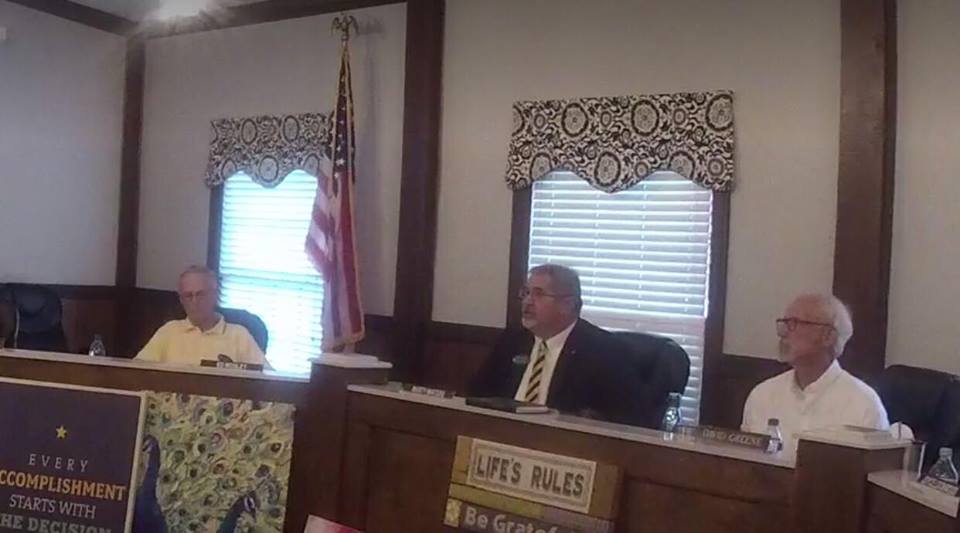
Members of the Evans County Board of Education heard from a fiesty crowd of citizens Monday evening at the second of three public hearings for the proposed millage rate for 2017.
The Board voted two weeks ago to advertise a proposed rate of 14.399 mills, the same rate as 2016, however, because property values have increased, the Board will actually collect more revenue even though the millage rate remains the same. The State of Georgia considers this a tax increase and requires a government entity to hold three public hearings for the public to voice concerns and ask questions. No hearings would have been required if the Board had opted to roll the millage rate back to 13.631 mills.
The Evans Board of Education millage rate has been above 14.0 mills since 2013, after raising it from 13.016 in 2012. In 2014, it was increased to 14.173, then lowered to 14.000 mills in 2015, and raised to 14.399 in 2016 where it remains.
Keeping the millage rate at 14.399 for 2017 means the Board of Education will collect 1.14% more in tax revenue ($35,794.72) than in 2016. Rolling it back to 13.631 would cost the BOE roughly $123,000, according to financial documents provided at public meetings.
Monday evening, citizens gathered at Claxton High School repeatedly pleaded with the Board and Superintendent Dr. Martin Waters to find ways to cut costs, sell old and unused properties owned by the Board of Education, and look to rolling back the millage rate. But both Dr. Waters and Board Chairman David Greene told citizens that they were unable to roll the millage rate back because state law requires it to be set at 14.0 mills for counties that receive equalization money. Equalization money essentially sends state dollars to smaller, less wealthy counties for the purposes of education. The grant is based on millage rate, student popoulation, and assessed property valuation, but requires a millage rate to be at a certain point so counties can’t inappropriately take advantage of the grant. Waters also told the crowd, “They’re actually considering raising that to 16.0 mills.” To date, the legislature has not considered that increase.
It is true that the Evans County Board of Education has one of the lower millage rates in the state, but that is a juggling act in order to maintain the money from the state.
Some background on the equalizations grants in Georgia is available here.
Click here to view the 2016 county millage rates across the state. Evans County is in the bottom 30 of county millage rates, with neighboring Tattnall, Candler, Montgomery, Toombs, Emanuel, Burke, Long, and Jeff Davis counties all with a lower rate. Bulloch County’s rate is also lower than Evans, however, the Bulloch County Board of Education receives 100% of the sales tax collected in the county, with the cities and county government receiving 0%. This boosts the county’s budget considerably.
Towards the end of the meeting, a citizen with family in Tattnall County asked Board Chairman David Greene why Tattnall County had a millage rate around 13.5. “Because they don’t receive equalization money,” he said.
Tattnall County, however, does receive equalization money every year -to the tune of $3 million – nearly three times that of Evans County. In fact, the Tattnall Board of Education voted Monday to advertise their millage rate at 13.514, keeping it the same as the previous years, instead of rolling back the rate to 13.339 because the law currently mandates school systems be at 13.5 mills. Not. 14.0. In fact, per Georgia law, school systems that receive equalization funds have until 2019 – two more years – to get the millage rate to 14.0 mills.
O.C.G.A 20-2-165 (a)(9)(C) reads:
Beginning July 1, 2015, having a millage rate or an equivalent millage of at least 12 mills; beginning July 1, 2016, having a millage rate or an equivalent millage of at least 12 1/2 mills; beginning July 1, 2017, having a millage rate or an equivalent millage of at least 13 mills; beginning July 1, 2018, having a millage rate or an equivalent millage of at least 13 1/2 mills; beginning July 1, 2019, and thereafter, having a millage rate or an equivalent millage of at least 14 mills.
(The entire code section is at the bottom of the article.)
A representative from AllOnGeorgia with knowledge of the situation spoke up to say the information Greene and Waters were giving citizens was not true.
Chairman Greene simply said, “Well that’s certainly a good point, we’ll look into it.”
That 1:30 clip of the meeting regarding the truthfulness of the law is in the video is below. The meeting in its entirety is available on the All On Georgia – Evan’s Facebook page.
CLIP: Evans County Board of Education told it is not being honest about Millage rate
Posted by All On Georgia – Evans on Tuesday, August 29, 2017
The meeting was adjourned shortly after the conversation about the law on the books, but Dr. Waters was presented with a copy of the law after the meeting. He read it and said to Board members, “Okay, I see now. It doesn’t have to be 14 mills until 2020.” He also said the information he was giving Evans County citizens was based on a Superintendents conference he attended in 2016.
Chairman Greene made no comment about where his information came from or why he told the crowd Tattnall did not receive equalization funds.
Waters also took to Facebook Monday evening saying the Board “mistated” the law and it would be addressed at the next hearing.
The Board of Education advertised and conducted millage rate evaluations legally, however, the justification offered to citizens – that it is a state mandate – is simply not true. Whether the statements made were “mistated,” ignorance of the law, or intentionally misleading is irrelevant at this point, though the Board could start the millage rate advertisement and public hearing process over.
Additionally, had the Board chosen to roll back the millage rate, it would not have been bound to rolling it back completely to 13.631, but could have set it anywhere between that and 14.399.
The next and final hearing on the millage rate is set for September 11 at 5:30 p.m. at the Evans County Board of Education office. You can contact the Board of Education at 912-739-3544.
[If you’re reading on a mobile device and cannot view the PDF of the code section, click here]
http://bulloch.allongeorgia.com/wp-content/uploads/sites/4/2017/08/OCGA-20-2-165.pdf
Jessica Szilagyi is a former Statewide Contributor for AllOnGeorgia.com.

1 Comment
Leave a Reply
Cancel reply
Leave a Reply

Bulloch Public Safety
03/04/2026 Booking Report for Bulloch County

Chattooga Local News
Oversight Committee Releases Bill and Hillary Clinton Deposition Videos

Chattooga Local Government
Fallen Heroes: Four Army Reserve Soldiers Die in Kuwait Drone Strike

Bulloch Public Safety
02/09/2026 Booking Report for Bulloch County

Bulloch Public Safety
02/16/2026 Booking Report for Bulloch County

Bulloch Public Safety
02/20/2026 Booking Report for Bulloch County

Bulloch Public Safety
03/02/2026 Booking Report for Bulloch County

Bulloch Public Safety
02/17/2026 Booking Report for Bulloch County









John S.
August 30, 2017 at 1:49 pm
Great question and comment by that young man!
Seems like the board got caught!
Maybe they just need to be more wise how they spend the money they do get and do away with all the waste!